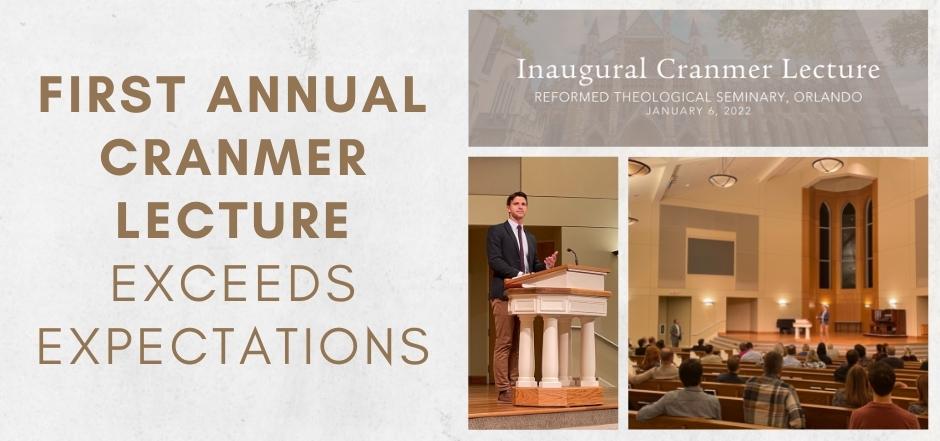In communication ahead of the evening, The Rev. Canon Dr. Justin Holcomb asked that the first annual Cranmer Lecture, a free event co-sponsored by the Diocese of Central Florida and Reformed Theological Seminary Orlando in Oviedo on the evening of Jan. 6, 2022, be “pastorally powerful and academically rigorous.” And according to Holcomb and others, that’s just what The Rev. Dr. Jonathan Linebaugh delivered in his address, “Comfortable Words: Praying and Proclaiming the Gospel in the English Reformation.”
“The fact that Linebaugh offered fresh historical, academic insights on this topic was wonderful,” Holcomb said. “In addition to being academically rigorous, the lecture also had an important influence on the ministry that clergy do, on being able to focus their attention afresh on the importance of these four scriptural passages that the Anglican tradition refers to as ‘the Comfortable Words,’ [Matt. 11:28, John 3:16, 1 Tim. 1:15, 1 John 2:1] and just highlighting their importance again.”
“It was profoundly meaningful to gather with both the RTS community and many from the Diocese of Central Florida as we remembered the English Reformation and Thomas Cranmer,” said Linebaugh, author and lecturer in New Testament at the University of Cambridge and fellow at Jesus College. “The first Cranmer Lecture offered us all a moment to return to our roots, to what Cranmer invites us to hear as “comfortable words”: the words of the one who said to the weary, ‘Come unto me,’ the words that say, ‘Christ Jesus came into the world to save sinners.'”
The opportunity for this informative, inspiring event came through two key diocesan partnerships: one with RTS, the other with the Lilly Grant Endowment Inc. Funds from the million-dollar Lilly grant awarded to the diocese in late 2020 helped fund the lecture as part of its emphasis on support for congregational leadership.
The diocese learned a key fact about its annual fall Clergy Conference in the research process ahead of the application for the Lilly grant, Holcomb said. “Many of the clergy preferred for that to be less academic and more like a retreat, more time to pray for each other, more social interaction.” The Lilly grant allowed the 2021 Clergy Conference, featuring Dr. Diane Langberg, to align with that change and provided for the January event with its more academic focus.
Holcomb praised the partnership with RTS, which took care of much of the planning, logistics and promotions as well as providing financial support. The event included heavy diocesan involvement, he noted.
“They invited Bishop Brewer to lead Compline,” Holcomb said. “They invited me to introduce the speaker, and after the speaker, they did a Q&A, but they also had one of our seminarians, Stephanie Soper, offer the final prayer. … Even The Rev. Dr. Jonathan Linebaugh is canonically resident in the Diocese of Central Florida, so he’s technically one of our clergy.”
An additional benefit for the diocese and others resulted from the invitation extended to Linebaugh. “While he was at RTS, they invited him to teach a class called ‘Anglican Doctrine and History,'” Holcomb said. “And I think approximately 10 people from the diocese were a part of that class.”
But the audience for the Cranmer Lecture included more than clergy and clerical aspirants, Holcomb said. “The seminary was hoping for 50 or 60 in attendance; we had well over 100.” That group included clergy, lay leaders, seminarians and others from the RTS community as well as others not connected with either RTS or the diocese who heard about the event and wanted to attend.
“The Cranmer Lectures are meant to help us as Christians better appreciate the theological riches that so marked the early English Reformation,” said The Rev. Dr. Mike Allen, academic dean of RTS Orlando. “Dr. Linebaugh helped us see how the ‘comfortable words’ written into the Book of Common Prayer by Cranmer were both influenced by earlier Reformed leaders but also profoundly significant pastorally for giving hope and comfort, needs which remain just as important for us today. We know it was a blessing to the seminary community and hope that it proves to be an encouragement and help to many from around the diocese. It’s wonderful to partner in ways that help resource faithfulness and fruitfulness in local churches.”

